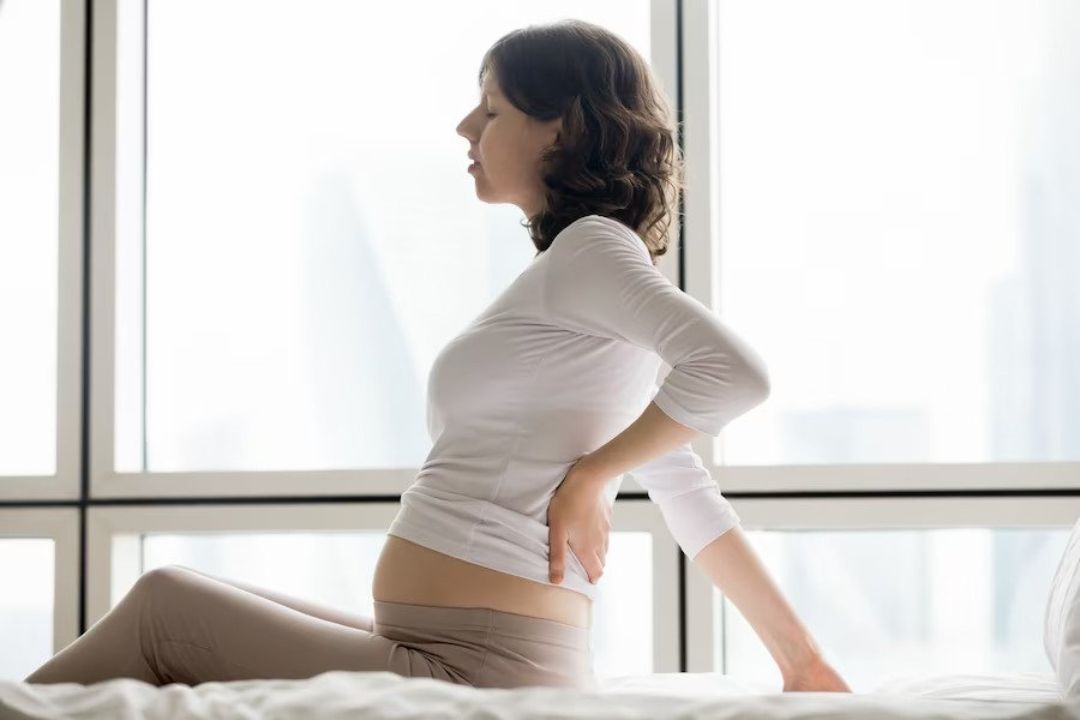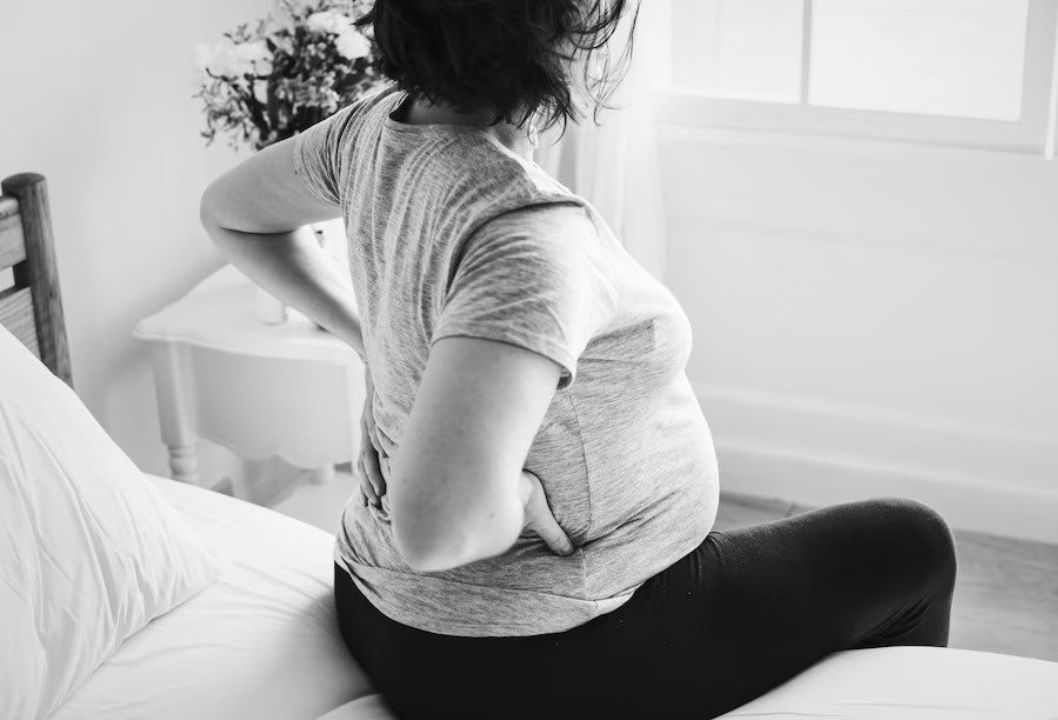Pregnancy-related back pain is a common complaint among expectant mothers, affecting up to 70% of women at some point during their pregnancy.
While it can be uncomfortable and frustrating, understanding the causes, symptoms, diagnosis, and treatment options can help you find relief from pregnancy back pain.
Several common causes of back pain during pregnancy include hormonal changes that loosen ligaments and joints, weight gain that puts extra pressure on the spine, and changes in posture due to a growing belly.
Symptoms may vary from mild discomfort to severe pain that interferes with daily activities.
A proper diagnosis of your back pain is essential to determine the underlying cause and develop an effective treatment plan.
Non-invasive treatment options such as physical therapy, exercise, and lifestyle modifications can provide significant relief. Medications should be used cautiously during pregnancy but may be prescribed if necessary.
Understanding the causes and seeking appropriate treatment for your pregnancy back pain can make this special time more comfortable and enjoyable.
Pregnancy can be a beautiful journey, but the constant struggle with pregnancy back pain makes any expectant mother want to scream.
The most common type of pregnancy back pain is lower back pain, which affects about two-thirds of pregnant women. This discomfort typically occurs in the second and third trimesters as the baby grows and puts pressure on the spine.
Another common source of pain is pelvic pain, caused by hormonal changes and increased pressure on the pelvic area. Ligament loosening can also contribute to pregnancy back pain.
Maintaining good posture throughout pregnancy can help alleviate some of this discomfort. Strengthening exercises that target core muscles can provide good support for the spine. Additionally, using pillows or cushions for proper lumbar support while sitting or sleeping may help relieve pregnancy back pain.
Among the various causes of back pain during pregnancy, one specific condition that can significantly impact the spine is sciatica. Sciatica occurs when the sciatic nerve, which runs from the lower back down to the legs, becomes compressed or irritated.
The growing belly and hormonal changes during pregnancy can contribute to increased pressure on the sciatic nerve, leading to the development or exacerbation of sciatica. The compression or irritation of the sciatic nerve can cause sharp, shooting pain that radiates from the lower back into the buttocks and legs.
Understanding the relationship between sciatica and the spine is crucial in addressing and managing pregnancy back pain effectively.
During this special time, you may experience discomfort in your lower back due to a variety of factors. Pregnancy back pain is a common complaint among pregnant women, and several reasons can cause it:
To alleviate pregnancy back pain, try exercises designed for pregnant women, maintain good posture, use footwear with good arch support, sleep on your side with a pillow between your knees, apply heat or cold packs to affected areas, or consult a healthcare professional for additional treatment options. Remember to listen to your body’s needs during this precious time.
As your body changes during this special time, expectant mothers may experience discomfort in their lower back due to various factors.
Pregnancy back pain is a common issue that affects many women. The weight gain and shifting of the centre of gravity can put extra pressure on the lower back, leading to low back pain. Hormonal changes can also contribute to back problems by loosening ligaments and joints, making them more prone to strain and injury.

Photo Credit: yanalya, Freepik
Symptoms of pregnancy back pain can vary from mild to severe. Here are a few major symptoms:
When you’re experiencing intense discomfort in your lower back, it’s crucial to seek a proper diagnosis from a healthcare professional who can provide the right treatment options and alleviate your pain.
Pregnancy back pain can have various causes, such as hormonal changes, weight gain, and changes in posture. However, it’s important to determine the specific cause of your back pain through a proper diagnosis.
A healthcare professional will conduct a thorough evaluation by asking about your symptoms, performing physical examinations, and possibly ordering imaging tests like X-rays or MRIs. This process will help identify any underlying conditions that may be contributing to your pain.
Once a diagnosis is made, appropriate treatment options can be recommended. These may include exercises to improve posture and strengthen muscles, physical therapy sessions, or medication to relieve pain and inflammation.
Seeking a proper diagnosis is essential for effective management of pregnancy back pain.
You can explore non-invasive options like exercises, physical therapy, and medication to manage your discomfort effectively.
Pregnancy back pain is a common condition that affects many expectant mothers. The causes of this pain can vary from hormonal changes to increased weight and pressure on the spine. Symptoms may include lower back pain, muscle stiffness, and difficulty standing or walking for long periods.

Photo Credit: Racool_studio, Freepik
Healthcare professionals will typically conduct a thorough physical examination to diagnose pregnancy back pain and ask about your symptoms. Once diagnosed, non-invasive treatment options can help alleviate the discomfort.
Exercises such as prenatal yoga or swimming can strengthen the muscles supporting the spine and improve flexibility. Physical therapy techniques like massage and heat therapy may also provide relief. In some cases, over-the-counter medications approved by your healthcare provider may be recommended to manage the pain effectively.
If you’re looking for ways to relieve discomfort during pregnancy, exploring safe and approved medications that can help alleviate your pain is important.
Pregnancy back pain is a common symptom experienced by many expecting women, and finding effective pain relief options is crucial for their well-being. While there are limited medication choices during pregnancy, some have been deemed safe when used as directed by healthcare professionals.
Acetaminophen, for example, is commonly recommended for mild to moderate back pain. It can provide temporary relief without posing significant risks to the mother or the developing baby. Nonsteroidal anti-inflammatory drugs (NSAIDs) should generally be avoided unless specifically prescribed by a doctor due to potential risks.
It’s important to consult with your healthcare provider before taking any medication during pregnancy to ensure it is appropriate and safe for you and your baby’s health.
Consider incorporating physical therapy and exercise into your routine to find relief from discomfort and improve your overall well-being. When it comes to back pain during pregnancy, physical therapy can be a valuable tool. It focuses on strengthening your back muscles, which can help prevent or ease back pain during this crucial time.
Here are four exercises that can strengthen your back and potentially alleviate some of the discomfort:
By incorporating these exercises into your routine, you may experience decreased low back pain and improved overall comfort throughout pregnancy.
Make small changes to your daily habits and routines that can help prevent and manage discomfort during this special time. Pregnancy back pain is a common issue that many women experience. You can reduce the risk of developing or worsening pregnancy back pain by making certain lifestyle changes.

Photo Credit: rawpixel.com, Freepik
Maintaining good posture is crucial, as it helps support your growing belly and reduces strain on your back. Avoid standing or sitting for prolonged periods and make sure to take breaks and stretch regularly.
Engaging in regular exercise, such as prenatal yoga or swimming, can also help strengthen your core muscles and alleviate pregnancy back pain. Additionally, using proper body mechanics when lifting objects and wearing supportive shoes are important for preventing further strain on your back.
Remember to consult your healthcare provider before making significant changes to your lifestyle routine.
If you experience severe or persistent back pain during pregnancy, or if the pain is accompanied by other concerning symptoms such as vaginal bleeding, fever, or numbness in the legs, it is important to seek medical attention for evaluation and guidance.
You can try various methods to relieve back pain during pregnancy, including practising good posture, using proper body mechanics, applying heat or cold packs, engaging in gentle exercises or prenatal yoga, wearing supportive shoes, using pregnancy pillows for added support, and considering prenatal massage or physical therapy. Consult with your healthcare provider for personalized recommendations.
Back pain during pregnancy can occur in different areas, but it is most commonly felt in the lower back, specifically the lumbar region. This is due to the increased strain on the muscles and ligaments supporting the growing uterus and changes in posture and centre of gravity.
Experiencing mild to moderate back pain in early pregnancy is considered normal. Hormonal changes, ligament stretching, and postural adjustments can contribute to back discomfort during this period. However, if you have severe or worsening pain or if you have concerns, it is always advisable to consult your healthcare provider for evaluation and appropriate guidance.